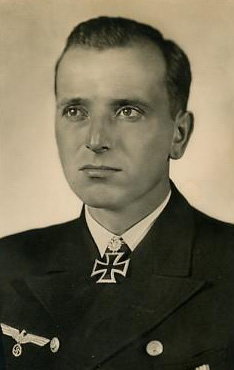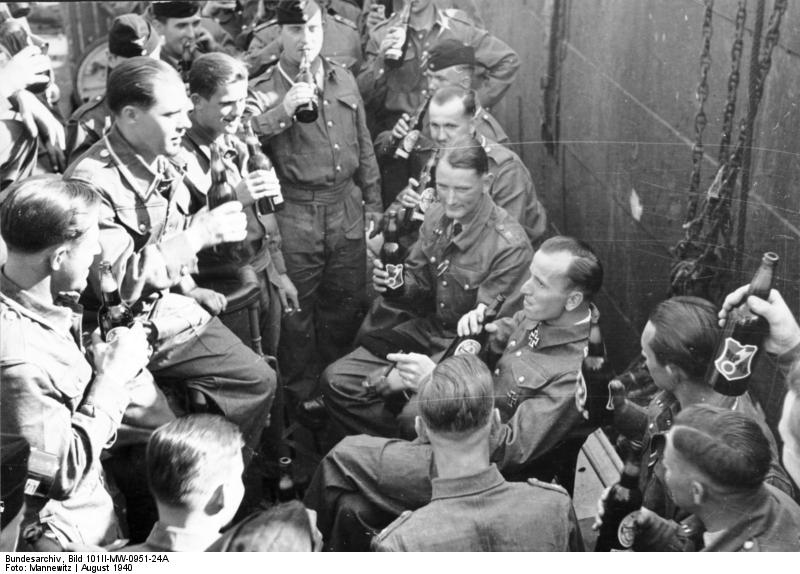<Back to Index>
- Paleontologist Pierre Teilhard de Chardin, 1881
- Painter Michiel Jansz van Mierevelt, 1567
- Flotilla Admiral Otto Kretschmer, 1912
PAGE SPONSOR


Flotilla Admiral Otto Kretschmer (1 May 1912 – 5 August 1998) was a German U-boat commander of the Second World War, and was the most successful Ace of the Deep. From September 1939 until being captured in March 1941, he sank 47 ships for a total of 274,333 tons. For this he received the Knights Cross with Oak Leaves and Swords, among other commendations. He earned the nickname "Silent Otto" both for his successful use of the "silent running" capability of the U-boats as well as for his reluctance to make radio broadcasts during patrols.
Otto Kretschmer was born in Heidau, Liegnitz. At the age of seventeen he spent eight months living in Exeter, where he learned to speak English fluently. He joined the Reichsmarine in April 1930, and attained the rank of Seekadett after completing officer training courses as well as three months' aboard the training ship Niobe. Later he spent about a year serving aboard the light cruiser Emden and in December 1934 was transferred to a posting aboard the light cruiser Köln. Kretschmer remained aboard the Köln until he was transferred to the U-Boat force in January 1936, where he received extensive officer training and was promoted to Oberleutnant zur See.
Kretschmer's
first
command was the U-35,
a
Type VIIA U-Boat, in 1937. This promotion coincided with Germany's
involvement in the Spanish Civil
War, and U-35 was ordered to patrol the Spanish coast. U-35 returned to Germany after
an uneventful patrol during which no ships were sunk. In September
1937, Kretschmer left the U-35 and
took
command of U-23,
a
Type IIB coastal U-Boat. The German invasion of Poland found Kretschmer still in
command of U-23,
and he was soon sent into action along with the rest of the Kriegsmarine's U-Boat fleet. His first war
patrols ranged across the North
Sea and around the
British coast. Kretschmer's first success came in Moray
Firth where he
attacked and sunk the Danish 10,517 ton tanker Danmark on January 12, 1940 using
torpedoes. The British admiralty at that time thought that the tanker
had struck a mine as they did not locate any
U-boat in the area. A month later on 18 February, Kretschmer sank the
1,300 ton British fleet
destroyer HMS Daring off the Pentland
Firth while she was escorting convoy HN-12 from Norway.
U-Boat
crews almost always avoided deliberately engaging enemy
destroyers, so the Daring's destruction was rightly
seen as a very skillful attack by both Kretschmer and the U-23. In April
1940, after eight patrols, Kretschmer left the U-23 and was transferred to the
newly-completed Type
VII B U-99,
and
in a sense started his legacy. After two months' training and
shakedown maneuvers in German waters, U-99 went into action in June
1940. During the first four patrols of the U-99, Kretschmer
started attacking convoys at night on the surface, taking down merchant
ships with highly accurate shots, using only one torpedo per target ship in order to
save ammunition, and the quote "One torpedo ... one ship" is attributed
to Kretschmer from around this time. Kretschmer's tactics were widely
copied throughout the U-Boat force, although they achieved mixed
results in practice. His most
successful patrol occurred in November - December 1940. During that
patrol, Kretschmer and U-99 sank three British armed merchant
cruisers, HMS Laurentic (18,724 tons), HMS Patroclus (11,314 tons) and HMS Forfar (16,402 tons). Laurentic and Patroclus were sunk on the night of
3–4 November after they responded to distress calls from the 5,376 ton
British freighter Casanare, which U-99 had mortally wounded about
250 miles west of Ireland. Forfar was sunk a month later on 2
December while steaming to join up with and escort outbound convoy OB-251.
Put
together, the three AMCs totalled over 46,000 gross tons. These
three successes earned Kretschmer the number one spot on the Aces list, and was never
surpassed. Klaus
Bargsten served
aboard U-99 under Kretschmer, before
being promoted to captain himself and becoming the sole survivor of U-521 on 2 June 1942. Kretschmer
was
also meticulous in his conduct towards the crews of torpedoed
ships. When attacking lone merchant ships in the days before wolfpack
tactics began in earnest, he had been known to hand down bottles of
spirits and blankets into lifeboats and give them the course to the
nearest land. On one patrol in September 1940, Kretschmer had also
retrieved a survivor of another torpedo attack who was alone in the
Atlantic on a small raft and took him aboard, transferring him later to
a lifeboat after his next successful attack. On his
last patrol in March 1941, he sank 10 more ships, but these were to be
Kretschmer's last victims. On 17 March 1941, during a counterattack by
British escorts of Convoy
HX-112, U-99 was disabled after repeated depth
charge attacks by
the British destroyers HMS Walker and HMS Vanoc.
Kretschmer surfaced and, under fire from the British vessels, scuttled
his boat. Three of his men were lost, but Kretschmer and the remainder
of U-99's crew were captured by the
British. The same day saw the British escorts score another success
against the Kriegsmarine:
another
noted U-Boat skipper, Joachim
Schepke, was killed aboard U-100 when that boat was rammed
and sunk in heavy fog by Vanoc. Kretschmer's
usual
standards of conduct were evident during the sinking of his boat;
he signaled HMS Walker asking for rescue for his men, took pains to
ensure as many left the submarine as possible, and assisted some of his
crew towards the rescue nets hung from the British destroyer.
Kretschmer's strength was evidently failing in the cold water and his
own rescue was at the hands of a British sailor who climbed down the
nets and plucked him from the water. Upon his
capture, he spent almost seven years as a P.O.W. in the hands of the
British. In 1943 German command tried to rescue him (Operation Kiebitz) but
that daring plan failed. In December 1947 he was allowed to return to Germany.
Four
of those years he spent in Canada at Bowmanville
POW
camp. Like several other surviving German naval veterans,
Kretschmer joined the post-WWII German Navy, the Bundesmarine.
He
joined the newly formed service in 1955 and two years later was
appointed commanding officer of the 1. Geleitgeschwader (1st Escort Squadron). The
next year he was transferred to the position of commander of the Bundesmarine's Amphibische
Streitkräfte (Amphibious
Forces).
From 1962 onward he served as a staff officer in NATO before
becoming Chief of Staff of the NATO command COMNAVBALTAP at Kiel in May 1965. He retired in
September 1970 as a flotilla admiral. In later
years Kretschmer was often interviewed for television and radio
programmes about the Second World War, and appeared in the 1974
documentary series The
World
at War. In the mid 1990s he was interviewed for the
computer simulation game Aces
of
the Deep, as one of several U-boat skippers whose interviews
were excerpted specially for the CD-Rom version of the game. During a
vacation in Bavaria during the summer of 1998,
he died in an accident on a boat on the Danube,
while
celebrating his 50th wedding anniversary. He was cremated and his
ashes were scattered at sea.
Even
though
Kretschmer only served for one and a half of the six years of
World War II, he would never be surpassed in terms of tonnage sunk. He
was awarded the Iron
Cross
2nd Class, the U-boat
War
Badge, the Iron
Cross
1st Class, the Knight's
Cross
of the Iron Cross, the Knight's
Cross
with Oak Leaves, and the Knights
Cross
with Oak Leaves and Swords. He was mentioned five times in the Wehrmachtbericht (3 August 1940, 19 October
1940, 4 November 1940, 17 December 1940 and 25 April 1941).
After
Kretschmer
left U-23 to assume command of U-99, U-23 participated in an unusual
move by the Kriegsmarine. U-23,
along
with five other boats, was transferred over land and by river to
the Romanian port of Constanza, from where they attacked Russian ships
steaming in the Black Sea. This group, called the 30th Flotilla, sank
many ships for the loss of three submarines, over two years. In August
1944, however, when Romania left the Axis powers, 30th Flotilla was
stranded with no way to return to Germany. The submarines were
scuttled. Recently, S. Kolay, a Turkish marine engineer, found the
resting place of the three scuttled submarines and visited the wreck of
one of them, U-20.